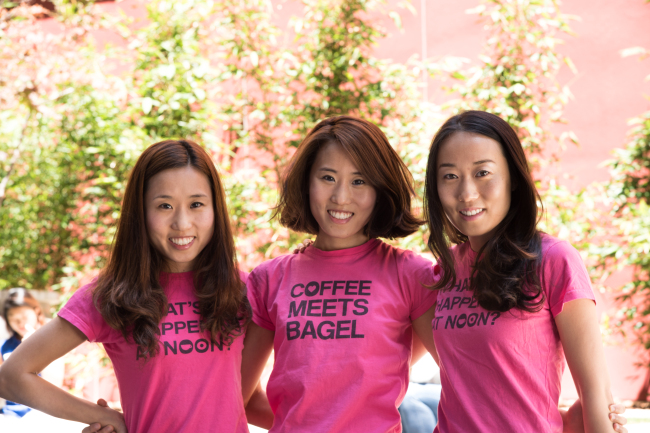SAN FRANCISCO ― Half a century after The Kim Sisters singing trio took the U.S. music scene by storm, three sisters from Korea are aiming to make their mark among San Francisco’s start-ups.
 |
From left: Dawoon, Arum and Soo Kang, cofounders of Coffee Meets Bagel. (Coffee Meets Bagel) |
The Kang sisters, who moved alone to the U.S. as teenagers, have been picking themselves up by their bootstraps their whole lives. And their experiences taught them the resilience and devotion that have helped them foster their start-up ― dating platform Coffee Meets Bagel.
“After having gone through that, my attitude is that there really isn’t much in the world that I can’t go through,” chief operating officer Dawoon Kang tells The Korea Herald at the company’s San Francisco headquarters. “When you face a challenge, somehow you figure it out. And it also brought the three of us a lot closer.”
Their opportunities in the U.S. are owed to the sacrifices of their father, a divorced mechanical engineer who sent the three through school in North America. Like many Korean parents of his generation, he dreamed for his daughters to go abroad, learn English, experience American culture and live out a life he never could. He sent them to study in Canada and then Hawaii in the late 1990s when eldest Soo was 15 and twins Arum and Dawoon ― whose names paired together mean “beautiful” in Korean ― were 12.
With their mother pretty well out of the picture and their father and brother devoted to their scrap metal recycling business in Korea’s Ansan, Gyeonggi Province, the teenage girls lived alone in the house their father bought and were left to fend for themselves ― save for their father’s friend, a neighbor who checked on them.
The 1997-98 Asian financial crisis hit the Korean won hard, as well as their father’s business. Even as the girls’ fellow Korean friends were forced to leave in the recession, their father found a way to keep them in school in the U.S.
“Now that I’m running this business, I understand how difficult it is to try to conserve cash for your employees, especially in a downtime like that, and trying to support your family,” Dawoon says, laughing it off as she dabs at the corners of her eyes. “I had no idea back then. So I feel like I owe him a lot for his sacrifice.”
The sisters finished high school and university, then ventured to New York to find jobs. Soo specialized in luxury brands and graphic design, Arum had a penchant for marketing analytics and Dawoon dabbled in finance and investment. Inspired by their father’s nonstop work ethic, they decided to start a business together.
They landed on creating a dating platform to tackle one of the most common problems facing their friends and themselves ― the existing services did not understand the way women want to date, Dawoon explains.
So they made Coffee Meets Bagel in 2012 with a focus on safety and privacy, which she says are women’s top concerns. Each day at noon, users are presented with one potential match’s profile and then have 24 hours to consent or pass on connecting. Only after mutual OKs are they introduced.
Their idea has proven popular enough to spread the brand from the U.S. to Sydney, Hong Kong and Singapore this year ― though no Seoul launch is in the works. Dawoon even met her boyfriend on the site, Arum and Soo, meanwhile, are married. The trio also famously turned down a $30 million acquisition offer on the U.S. start-up reality show “Shark Tank” in January, which only increased their spotlight.
The COO believes their early stages were boosted by the global Korean network, starting with their first adviser being a Korean adoptee and first investor having a Korean-American partner. They also noticed that several early users were Koreans and Korean-Americans who joined because they knew the founders were compatriots.
Dawoon hopes one day to give back to that community by making a difference in Korean society, especially for women. But for now, the Kangs are fully devoted to fulfilling the potential of their start-up.
“I think the great thing about the Korean community is that people are willing to help each other out, just by the fact that we’re Koreans,” she says. “There’s part of me that at some point wants to go back ... and I really want to be a catalyst there. It’s always at the back of my mind.”
By Elaine Ramirez, Korea Herald correspondent (
elaine@heraldcorp.com)








